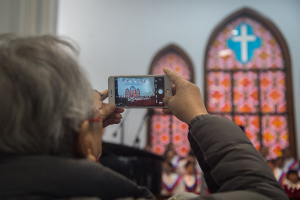Iranian Women Defy Hijab Rule by Exposing Hair in Cars
Women in Iran have sparked a national debate by defying the hijab rule and exposing their hair in cars. This defiance of Sharia law has prompted the police to impose a crackdown on violators who allow their Islamic headscarf rest on their shoulders while driving their vehicles.
During the '70s and even before that, Iranian women were not required to cover their hair with a hijab. Things changed since the 1979 revolution when the late Shah Mohammad Reza Pahlavi was ousted and was replaced by the founder of the Islamic Republic Ayatollah Ruhollah Khomeini.
Since then, Iran enforced a dress code that required women to cover their hair with a hijab. But over the past few years, women have been posting selfies on social media without a hijab. A movement called #WhiteWednesdays was also started, wherein women wear white articles and remove their head coverings in their cars.
This show of defiance resulted in a backlash from authorities. In 2015 alone, police caught or fined over the course of eight months over 40,000 thousand cars driven by women who did not cover their hair properly with the compulsory hijab. But the resistance continued as women insist that their cars are private spaces similar to their homes.
Iran's moderate president, Hassan Rouhani, opposed the crackdown on women who don't wear the hijab and explicitly told the police to respect people's private spaces and that their job was not to administer Islam. "That's not a police [officer]'s business," he said in 2015.
But authorities disagree. "What is visible to the public eye is not private space and norms and the rules should be respected within cars," said Iranian police spokesman Saeid Montazeralmahdi. He also warned car owners against using tinted windows to prevent them from being seen.
For Hadi Sadeghi, deputy head of Iran's judiciary chief, the only private space in a car is the trunk and not the visible parts like the driver and passenger seats. But lawyer Hossein Ahmadiniaz argued that only lawmakers can define the private space, not the police.



























